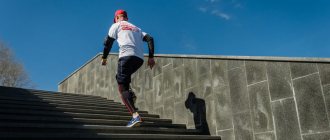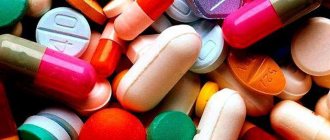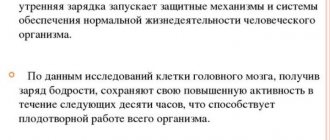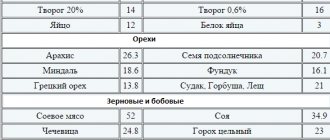There are many rumors regarding the effect of alcohol on muscle growth. Some believe that drinking after a workout is beneficial because of the carbohydrates contained in alcohol. Others are categorically against strong drinks, believing that muscle growth and alcohol consumption are in no way compatible.
Alcohol and muscles - can you drink after a workout?
There are many rumors regarding the effect of alcohol on muscle growth. Some believe that drinking after a workout is beneficial because of the carbohydrates contained in alcohol. Others are categorically against strong drinks, believing that muscle growth and alcohol consumption are in no way compatible.
Let's figure out which position is correct and find out what will happen to the muscles if you drink alcohol after training. Let's look at the effect of alcohol using the example of the most popular alcoholic drink - beer.
Useful article: Does beer make your belly grow and is it possible to drink beer while losing weight?
Desire to reward yourself
Let's look at the reasons why most people methodically attend workouts. Everyone wants to have a slim body, strong biceps and firm buttocks. However, fitness enthusiasts rarely do not associate sports with a lifestyle. They view their training as a mandatory duty that will lead them to their desired goal.
Non-professional athletes love to reward themselves. Ran an extra three kilometers? Then you can indulge in a piece of cake or a sweet alcoholic cocktail on the way home. Sometimes get-togethers at the bar with friends drag on until the morning. But are working out and whiskey and soda really compatible? And if drinking alcohol is not forbidden, then how long should you wait to pick up a glass of booze?
How long after training can you drink alcohol?
The worst thing you can do for your body is to drink in the first hour after completing physical activity. The first 60 minutes after exercise is a critical period of time during which rehydration, electrolyte and energy replenishment occurs.
There is much less chance of seriously harming the body if 6 hours pass between training and drinking strong drinks. Thus, when planning evening gatherings with friends, you should go to the hall before noon.
How does alcohol affect an athlete's body?
First, let's figure out how alcoholic drinks affect the human body as a whole? You can thank your liver for taking the brunt of it by breaking down and metabolizing toxins. However, ethyl alcohol first enters the stomach, which means its next destination will be the blood, and only then the liver and kidneys. In this situation, the body of a drinker spends precious energy on detoxification every time. If we talk about alcohol as a reward after a hard workout, then this measure seems very counterproductive.
Paradoxically, the absence of paintings visually makes the room smaller
Thornto Green Hill Library features interactive design
Pastel colors and cozy rugs: how to create a 50s interior design
When all the main resources are devoted to the rapid breakdown and elimination of alcohol from the body, you will have to say goodbye to the thought of the effectiveness of exercise. Your metabolic processes slow down significantly when you metabolize alcohol, and you won't be able to reap the benefits of burning more calories at rest for several hours afterwards. Also, your body will not be able to start useful processes such as muscle recovery and muscle cell growth. In this regard, fans of weightlifting and strength training who want to acquire sculpted muscle mass will suffer the most.
Decreased testosterone production activity
The effects of alcohol also affect testosterone, which is necessary for all activities aimed at developing strength and endurance. To gain muscle mass, protein synthesis is required, triggered by the male hormone. Any strength load requires testosterone, and ethanol suppresses the production of enzymes involved in the formation of testosterone by 23% - these figures were also obtained during an experiment on rats.
When there is not enough hormone, then:
- muscle recovery slows down after training;
- strength indicators decrease;
- abdominal fat appears;
- there is a feeling of constant fatigue;
- muscle mass decreases;
- mood worsens.
Under the influence of alcohol, the body accumulates estrogen, which reduces the amount of testosterone. Studies say that in the blood of military personnel who often liked to drink, the amount of testosterone was low and estrogen was high.
Testosterone and ATP (adenosine triphosphate) are interrelated: the hormone builds muscle structure when there are sufficient energy reserves. The cell contains:
- cytoplasm, consisting of protein and water;
- a nucleus with many receptors and hereditary information.
Androgen receptors constantly move between the nucleus and the cytoplasm, and if they do not have energy, then anabolic muscle growth stops.
The adenosine triphosphate molecule is not immediately consumed during training. During breaks, it is partially restored, but several approaches can create a fairly strong load. Energy reserves are depleted. During intensive exercise lasting an hour, a large amount of cortisol, the fatigue hormone, is released in the body, and further training can be harmful. ATP continues to work afterward, replenishing the costs of muscle tissue development. Recovery takes on average 1-4 days.
Due to a lack of testosterone, a state of overtraining occurs that requires serious treatment. And alcohol negatively affects the formation of the hormone.
It is worth adding that one glass of wine slightly increases the level of the hormone, and moderate consumption does not have negative consequences. With chronic alcoholism, the rate of testosterone breakdown in the liver increases fivefold.
Other negative consequences
The bad news didn't end there. Alcohol thins the blood, which in case of bruises and other injuries potentially leads to internal bleeding. Alcoholic drinks negatively affect brain cells, the functions of the cardiovascular system and prevent you from sleeping soundly. Well, good sleep is crucial in restoring the body, especially when it comes to ultra-intense exercise.
If none of the above arguments convince you to avoid going to the bar when you get home from the gym, you might want to consider cutting back on your drinks. We also recommend that you maintain the required time between finishing the lesson and receiving the “reward.”
From the 1939 model to the 2020 car: the evolution of the Lincoln Continental in one video
India: Villagers restored three km of road during quarantine
Extroverts have more friends: why introverts have a harder time with quarantine
Minimum abstinence time
Currently, science does not have a large number of studies that would be aimed at studying the effect of alcohol on the athlete’s body. However, most experts agree that drinking immediately after exercise will ruin all your efforts and even harm you. HIIT takes a lot of energy, increases the heart rate to abnormal levels and requires recovery.
Therefore, you need to delay drinking alcohol for at least an hour after finishing your workout. This is the period that is critical for recovery. He demands electrolyte drinks instead of beer and tequila. Together with sweat, not only water leaves your body, but also important macroelements: sodium and potassium. Orange juice without sugar, diluted with water, or mineral water without gases helps to replenish the electrolyte balance in the body.
Sports nutrition and alcohol
As mentioned above, one of the main effects of alcohol on the body is a decrease in the rate of muscle fiber formation. This in itself makes both training while drinking alcohol and using any type of sports nutrition to build muscle mass pointless.
In addition, many types of combined sports nutrition, when mixed with alcohol, can pose serious health risks. It is worth knowing that most types of gainers and complex cocktails for weight gain contain various types of permitted stimulants (guarana, caffeine, thiamine, etc.). When used in the dosages specified by the manufacturer, such substances should not have side effects, but if mixed with alcohol, they pose a significant health hazard.
Ideal abstinence time
Ideally, one hour between training and drinking is the absolute minimum. If you can, experts recommend waiting at least six hours. For individuals who practice serious strength training, the period of abstinence is doubled. So if you're heading to the gym in the afternoon, your evening should be alcohol-free.
Senegal parrot and snake: what pets should introverts have?
The cat called passers-by to the store for food. In the end he got food and a new home
I made an original flower pot in the country from an old cinder block.
Negative effect on protein synthesis
Research shows that ethyl alcohol can have a negative impact on the rate of protein synthesis, the process by which your muscles strengthen, grow and repair. In this regard, those who practice 3-4 workouts per week are in a better position than those who train on a daily basis. This does not mean that we encourage you to cut back on your activities. This means we encourage you to reduce your alcohol consumption.
Alcohol slows recovery
When you train hard, actin and myosin fibers come into play, which are responsible for muscle contraction. If everything is done correctly, the muscles after push-ups become stronger and have time to recover. But if you drink a margarita after a workout, your body won't get any of the benefits from repeated repetitions. Here's another fact that speaks against drinking alcohol after the gym. Scientific studies have shown that alcohol reduces levels of human growth hormone, which helps the body build muscle mass.
Decreased growth hormone production
Growth hormone (somatotropin) affects the construction of muscle structure and stimulates cell growth. It is produced every three to four hours while a person sleeps and is responsible for the following functions:
- regulates carbohydrate metabolism;
- stimulates protein synthesis;
- helps bone tissue absorb calcium;
- reduces subcutaneous fat mass;
- increases the volume of muscle tissue, retaining fluid;
- increase in dry body mass.
However, alcoholic drink worsens the quality of sleep, preventing the formation of somatotropin by 50-70% for another two days after consumption. Decreased growth hormone production affects various processes.
Low levels of the hormone lead to a failure of these functions, which prevents the desired results from being achieved. After twenty years, its production decreases over time, and in old age the body produces very little of it. Drinking alcohol speeds up the reduction process.
Emphasis on moderate consumption of alcoholic beverages
It is worth noting that the amount of alcohol consumed significantly affects the decrease in the effectiveness of training. Two scientific studies looked at the rate of protein synthesis in people who drank different amounts of alcohol. The results of both experiments were published in the Journal of Clinical Investigation.
In one case, the rate of protein synthesis was found to be suppressed by 24 percent after consuming just 71 grams of pure alcohol (equivalent to five bottles of beer). The second study revealed the size of the maximum portion of alcohol that does not affect this important process. It turns out that if you drink no more than 28 grams of alcohol (the equivalent of two bottles of beer), your muscles can avoid the negative effects of drinking on protein synthesis. As you can see, moderation will be your best solution.










